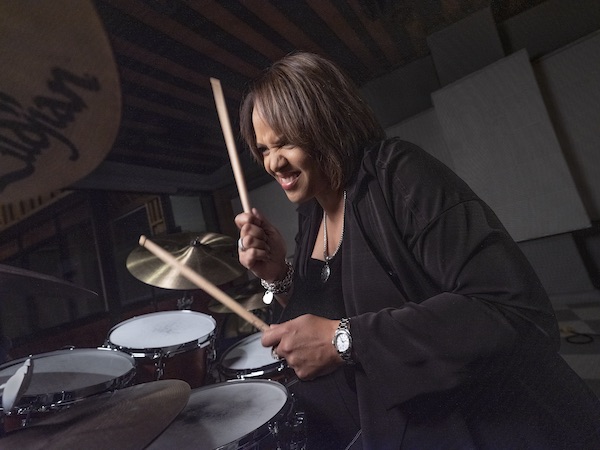Jan 13, 2026 2:09 PM
More Trump-Kennedy Center Cancellations
The fallout from the renaming of the John F. Kennedy Center for the Performing Arts to include President Donald…

Terri Lyne Carrington, seen here in New York at Power Station at BerkleeNYC, is the first female instrumentalist to top the Jazz Artist category in the DownBeat Critics Poll.
(Photo: Jimmy & Dena Jatz)“It’s so easy for that song to just be pretty, but it’s not about being pretty,” Ray said.
The words, joined to a set of portentous harmonies, do not paint a pretty picture. Written in the days after the 2016 election, they close the tune with a rhetorical flourish mirroring the frustration of many voters at the time: “How long can freedom wait before we hear it ring?/ The waiting game is/ No more.”
The qualities of ringing resonate in Carrington’s universe. Case in point: “Bells,” on which Ray also interprets Carrington’s lyrics. With a YouTube video of the Castile horror on her mind, Carrington heard in Parks’ ringing harmonies a mournful song.
“It immediately felt like church bells at a funeral,” she said, adding that she was haunted by the thought of the people left behind after the shooting. “That was the imagery that came to mind when I wrote that piece.”
“Bells,” like most of the tunes on the album, took a long time to evolve from inspiration to realization. Only after Carrington became intimate with the demo of Parks’ instrumental did she take it to the studio and start adding percussive and electronic elements, finally affixing lyrics and bringing Ray into the picture.
At the same time, she was considering candidates to deliver a spoken-word text she had written. But she had a change of heart, instead recruiting Warner, who had appeared on her 2002 album, Jazz Is A Spirit, to contribute commentary, and in the process she ditched her text in favor of his.
The use of spoken word and voice samples reaches its apex on “No Justice (For Political Prisoners).” The sextet seethes under layers of spoken-word passages from Meshell Ndegeocello and Mumia Abu-Jamal, as well as voice samples from Davis, Assata Shakur, Laura Whitehorn, Leonard Peltier and Marilyn Buck.
Carrington said that some voices proved difficult to obtain, like that of Abu-Jamal, who is being held in a state prison in Pennsylvania. As an act of resistance, he asked her not to pay the $200 that prison radio was charging to use his voice. So she transcribed the contents, available on YouTube, and sent them to Abu-Jamal, who read his own words back in a phone call she recorded. At his request, her recording retains a background announcement heard over the prison loudspeaker.
Complications of a more musical nature affected “Pray The Gay Away.” Hip-hop artist and Berklee educator Brian “Raydar” Ellis composed lyrics to be rapped and sung for the piece. Some of his words remain. But a reordering of the musical parts caused Carrington to take the song in a different direction: “Once I rewrote the music, I thought, ‘What about a strong trumpet here?’” That is where Nicholas Payton, an iron-willed artist in his own right, came in.
Originally, Payton laid down the melody and an improvisation; his improvisation is all that remains. “In the end, the texture of the trumpet playing the melody wasn’t working for me,” Carrington explained. “As a producer, you have to figure out where that point is, where your vision meets the artistic nature and offering of the person in the studio with you. I push as far as I can for my vision, and I listen and accept their offering. I try to figure out a way that it all meets together so that it’s satisfactory to everybody.”
Amid all the heavy issues surrounding the project, Carrington found some relief by interpreting Joni Mitchell’s “Love” (from the singer-songwriter’s 1982 album, Wild Things Run Fast): “I felt like the way this record was shaping up, [Mitchell’s song] was related thematically, because if we try more of that [love], some of these other issues will work themselves out. The point of that song being there is to offer an antidote.”

Belá Fleck during an interview with Fredrika Whitfield on CNN.
Jan 13, 2026 2:09 PM
The fallout from the renaming of the John F. Kennedy Center for the Performing Arts to include President Donald…

Peplowski first came to prominence in legacy swing bands, including the final iteration of the Benny Goodman Orchestra, before beginning a solo career in the late 1980s.
Feb 3, 2026 12:10 AM
Ken Peplowski, a clarinetist and tenor saxophonist who straddled the worlds of traditional and modern jazz, died Feb. 2…

The success of Oregon’s first album, 1971’s Music Of Another Present Era, allowed Towner to establish a solo career.
Jan 19, 2026 5:02 PM
Ralph Towner, a guitarist and composer who blended multiple genres, including jazz — and throughout them all remained…

Rico’s Anti-Microbial Instrument Swab
Jan 19, 2026 2:48 PM
With this year’s NAMM Show right around the corner, we can look forward to plenty of new and innovative instruments…

Richie Beirach was particularly renowned for his approach to chromatic harmony, which he used to improvise reharmonizations of originals and standards.
Jan 27, 2026 11:19 AM
Richie Beirach, a pianist and composer who channeled a knowledge of modern classical music into his jazz practice,…